Are you asking yourself how will the COVID-19 crisis impact your consulting job search? You’re not alone…
I recently surveyed the CareerInConsulting community members to understand what would be the most helpful for them now.
Unsurprisingly the COVID-19 crisis was mentioned many times.
Some respondents mentioned the impact of the COVID-19 crisis on consulting firms’ recruitment: are consulting firms still recruiting? Is it still possible to get an interview? Is the recruitment more competitive? Are my chances to get a job in Consulting lower now?
Other respondents mentioned the impact of the COVID-19 crisis on their interview preparation: they cannot do mock cases while being anxious for their friends & family, they feel frustrated to live 24/7 in a 20 sqm apartment, or they have difficulty to find a case partner while staying home.
Maybe you are asking yourself the same questions or feel the same?
If yes, this article is here to help you.
You’ll find my opinion on how the COVID-19 crisis should impact recruitment in the Consulting industry and the 6x actions that can help your Consulting job search.
- In 2020: unsurprisingly, recruitment in the consulting industry will be negatively impacted due to sluggish economies and cuts in consulting spending
- However:
- This drop in recruitment should be (a little bit) mitigated by an increasing number of consultants leaving their firms for non-consulting jobs
- And all the consulting firms won’t be affected the same way, depending on the services they provide and the industries they serve. For instance, a consulting firm specialized in Pharma should be less impacted than a firm serving clients in the Travel & Tourism industry
- In 2021: recruitment should come back to “normal”:
- Some industries (travel, tourism, restaurant) are badly hit, but there is no risk of a systemic financial crisis. To quote Warren Buffet: “2008 was much scarier (economically) than 2020”
- China has already got COVID-19 under control and put workers back into factories (as of April 2020)
- A vaccine will likely be developed in the next 12 to 18 months
Table of Contents
Get 4 Complete Case Interview Courses For Free

You need 4 skills to be successful in all case interviews: Case Structuring, Case Leadership, Case Analytics, and Communication. Join this free training and learn how to ace ANY case questions.
The COVID-19 Crisis Background
The coronavirus outbreak is a large and unexpected supply and demand shock for both the Chinese and global economy, given the important role China now plays in global growth:
- It’s a Demand shock with a drop in the consumer spending due to the lockdown. For instance, in many countries now, the major sport events have been cancelled or postponed, all the theaters are closed, etc.
- And it’s also a Supply shock due to prolonged factory shutdowns
So, it’s now clear that the economy is currently undergoing serious blows despite the governments and central banks’ responses.
In addition, experts predict that the magnitude of the impact and the duration of the economic disruption will affect all countries, but with geographic differences though.
For instance, Roland Berger has estimated a drop in the global GDP growth rate from 3.3% to -1.9% (-5.2 ppts) in 2020 (-5.8 ppts in Europe and -7.1 ppts in the US).
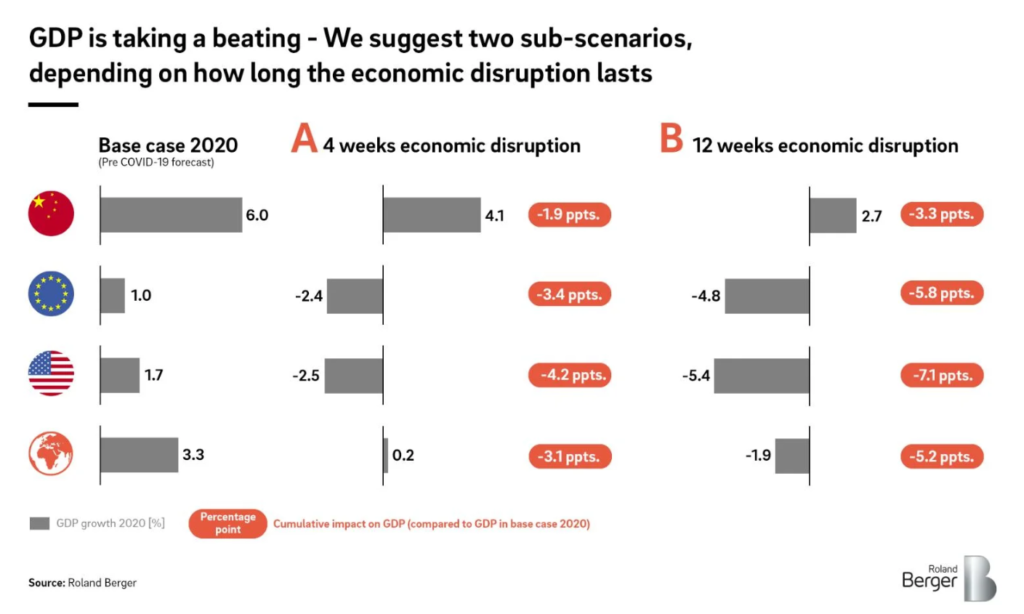
Secondly, both annual profitability and short-term liquidity will be impacted, and the magnitude of these impacts will differ by industry.
Some industries such as Travel, Airline and Tourism will be hit strongly on both fronts.
For instance, Tourism and Travel have already experienced short-term cancellations and a sharp drop in cash inflow as new bookings for June to August evaporate.
Other industries such as Automotive and Logistics, will take a similar blow to short-term liquidity, but can make up some of their losses after the COVID-19 crisis ends.
For instance, the Logistics industry is seeing a big drop in profitability as production stops, but the rebound effects when the situation relaxes can lead to a partial catch-up.
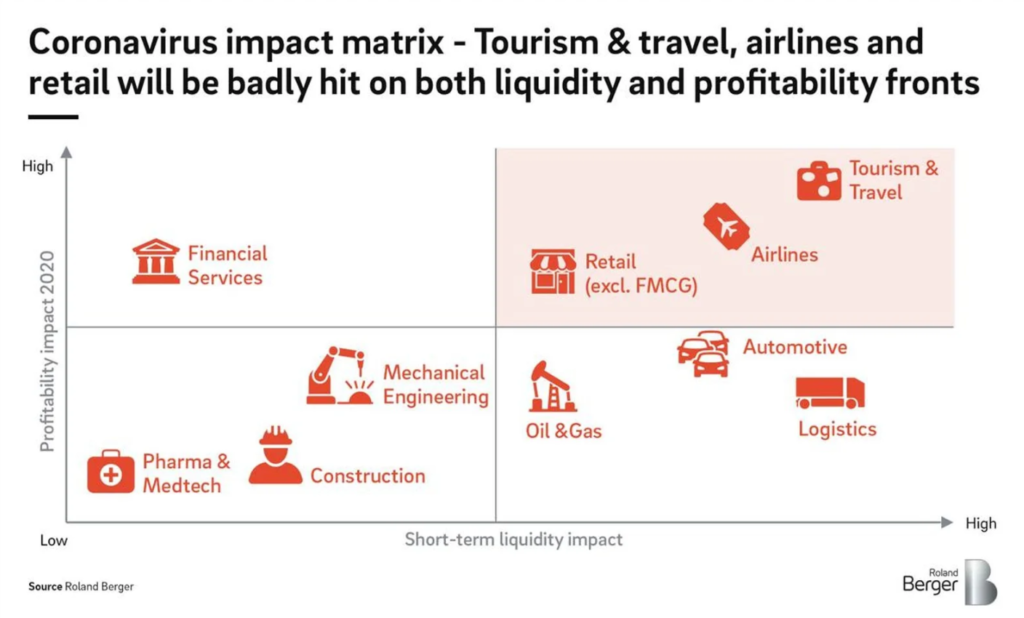
- All countries and industries will be affected by the COVID-19 crisis
- However, some regions and some industries will recover faster and better than others
How The COVID-19 Crisis Should Impact Recruitment
COVID-19 Crisis: Impact In The Short Term (2020)
Due to sluggish economies and cuts in consulting spending (clients delaying projects, decreasing their scope or cancelling them all together), the global consulting market should decrease by 19% in 2020 (-$30 billion) according to Consultancy.org (from data collected from hundreds of consulting firms worldwide).
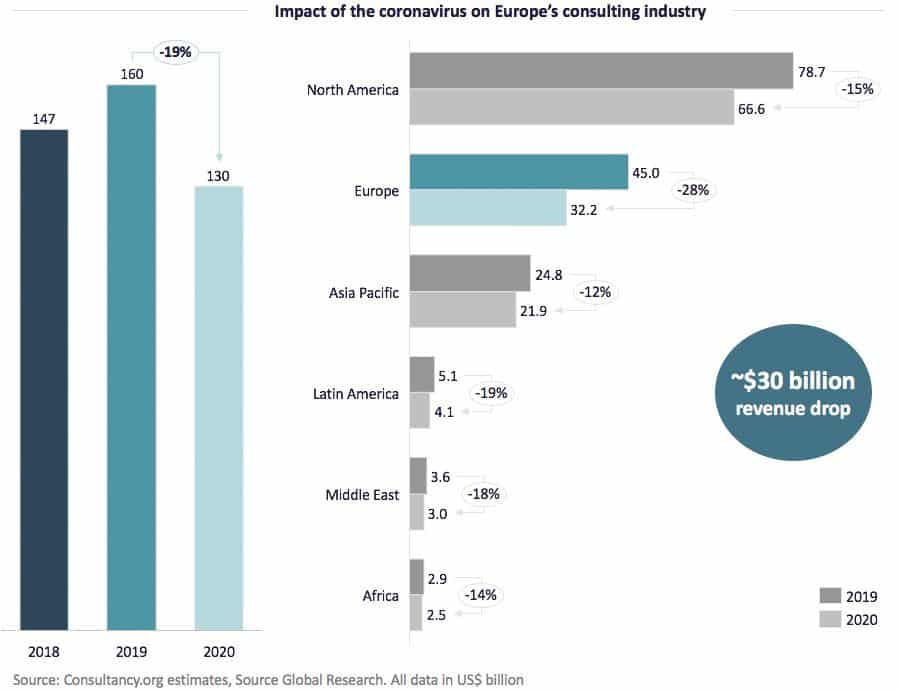
To state the obvious, this drop in revenues should lead to a drop in new hires.
However, this drop in new hires should be mitigated by an increasing number of consultants leaving for non-consulting jobs:
- Consulting firms should lay off more employees than usual (“let’s take this opportunity to ask the less performant employees to leave”), and
- More employees should decide to leave for a non-consulting job (“I won’t get all my bonuses, so why should I stay and work 80 hours per week?”), for instance, to join a big corporation or to create their own company
If you are a young graduate looking for a job in consulting right now, I’ll tell you what to do later in this article.
But first let’s discuss the mid-term impact of the COVID-19 crisis on recruitment in the Consulting industry.
COVID-19 Crisis: Impact In The Mid Term (2021)
The COVID-19 crisis already hits certain parts of the economy such as restaurant, entertainment, airline, and hotel industries with a significant drop in demand. These sectors have been hit hard by the coronavirus, but our economy is quite large.
First, there doesn’t appear to be any systemic risk of the financial system itself.
In other words, people will lose money through the financial system, but the financial system itself is not in jeopardy.
Second, China has already gotten the COVID-19 under control. They will be slowly allowing workers back into the factories and have developed a rapid-response process. If there is a local outbreak, they will have the infrastructure to do a better job containing it.
Lastly, the development of a vaccine for coronavirus seems likely, though probably in 12 to 18 months. Other infectious diseases have caused major losses of human life in history, and vaccines have been developed to prevent much of those losses.
In conclusion, to paraphrase Warren Buffett, 2008 was far scarier (economically) than 2020.
2020 is far scarier from a societal and humanitarian perspective but not from a systemic, economic-risk perspective.
So, from an economist’s point of view, this is a hit on the economy, but a temporary one. When the problem that caused all of this will be under control, we will be able to see the light at the end of the tunnel and recruitment in the Consulting industry should be back to “normal” in 2021.
Action #1: Get Referrals
In challenging times, getting interviews is even more competitive.
Therefore, getting referrals from insiders is even more important than before.
To do so, I would suggest going through the following 3x step approach:
- First step. Identify who are the people that can more easily help you
- Second step. Write them a customized email
- Third step. Have a call with the consultant, and indirectly ask for a referral
Step 01: Identify Who Are The People That Can Easily Help You
You will get higher response rate with people with whom you have something in common.
For instance, find contacts who:
- Come from the same school
- Have common connections
- Worked in the same company before
To find potential connections, use LinkedIn, your school alumni association and your friends & family.
Since the end goal is to get a referral, the higher level in the hierarchy (Manager, Director or even better Partner) your contacts have, the better.
Also, you should keep track, for instance in an excel file, of all the people you have contacted. Actually, you don’t want to contact the same person twice.
Step 02: Write Them A Customized Email
Now it’s time to write an email to your target connections.
Here your objective should be to plan a call to get advice; it should NOT be to ask directly for a referral.
Your message should have 2x parts:
- Provide some context on why you are contacting the person
- State your interest in his/her profile and request to talk to him/her in order to listen and learn
Here is a sample message to contact a Consultant:
Hi [ Your Contact Name ],
[Provide some context on why you are contacting the person]
My name is [ Your Name ]. I am currently [ Your situation, for instance student at Harvard ] and I am exploring new career opportunities, including whether [ Your Contact’s Firm Name ] would be a good fit for me.
[Request to talk to the person to listen and learn]
Since you are working at [ Your Contact’s Firm Name ], it would be great to learn from you about the Consulting industry and your experience at [ Your Contact’s Firm Name ].
Please let me know if you are free over the next couple of weeks for a 10-minute chat by phone. I’d appreciate the chance to ask questions.
[Close positively the message]
I’m really looking forward to speaking to you.
Thanks again,
[ Your Name ]
Sample subject lines:
- Friend of [mutual acquaintance] who needs your advice
- [Mutual acquaintance] recommended we speak
- Fellow [your college] grad who needs your advice
- Time for a fellow [college name] grad?
If you haven’t received a response after a week, you should always send a follow up email. If there are no replies there, move to the next contact.
Step 03: Have A Call With The Consultant And Indirectly Ask For A Referral
First, start the call by thanking your contact for his / her time.
Secondly, introduce yourself. Thus, before the call, you must have your pitch (a 30 second presentation of your background) ready. Check this article to help you develop your pitch.
Example of how to start a call:
“I’d like to thank you again for your time. It will be very helpful for my job search.
Let me tell you about my background so that you know a little bit more about me”
Then, ask 3-4 questions about the personal experience of your contact.
Some examples of questions you can ask during a call:
- Why did you choose [company name]?
- What do you like / dislike about consulting? How does it differ from your initial expectations?
- Why have you decided to pursue a career in consulting?
- How would you describe the culture of this office? How this culture would differ from other offices?
- What previous professional experiences have helped you most in this role?
- How is your company different from other firms?
- What is the biggest challenge that awaits the person who will move to Consulting?
- What’s one thing you wish somebody would’ve told you before going into this field?
Then, before the end of the call, you should ask (indirectly) for a referral.
For instance: “If you were in my position, how would you secure an interview at [ ]?”
Note: be sure to have a CV and cover letter ready: the person can ask you to send your documents right after the call.
Finally, close the conversation by thanking your contact again.
Action #2: Keep Applying (But Strategically)
It is necessary to keep applying.
First, because even during an economic crisis, Consulting firms still have projects.
In other words, Corporations and governments continue to hire consultants, even in crisis times.
For instance, they can hire consulting firms for projects such as:
- Streamline operations and cut costs: many businesses will be willing to optimize their operations and their cost structure, as well as accelerate their digital transformations to fit the new market realities
- Work on Private Equity projects: many companies will be cheap and “on the market”. Private Equity funds will use consultancies to get external perspectives on the deals
- Review Supply Chain: Supply chains have been disrupted during the COVID-19 crisis and many dysfunctionalities were exposed. Businesses will ask consultancies to help them review their supply chain strategy and operations
- Update strategies: companies will have to update their business plans and their strategies to find where new opportunities can be captured
Secondly, all the Consulting firms won’t be affected the same way.
If you have skipped the first section of this article, here is the key insight: all businesses will be impacted by the COVID-19 crisis, but the magnitude of the impact and the speed of recovery will be based on their industries and geographies.
Hence, the magnitude of the negative impact for a Consulting firm will vary based on the services they provide and on the industries they serve.
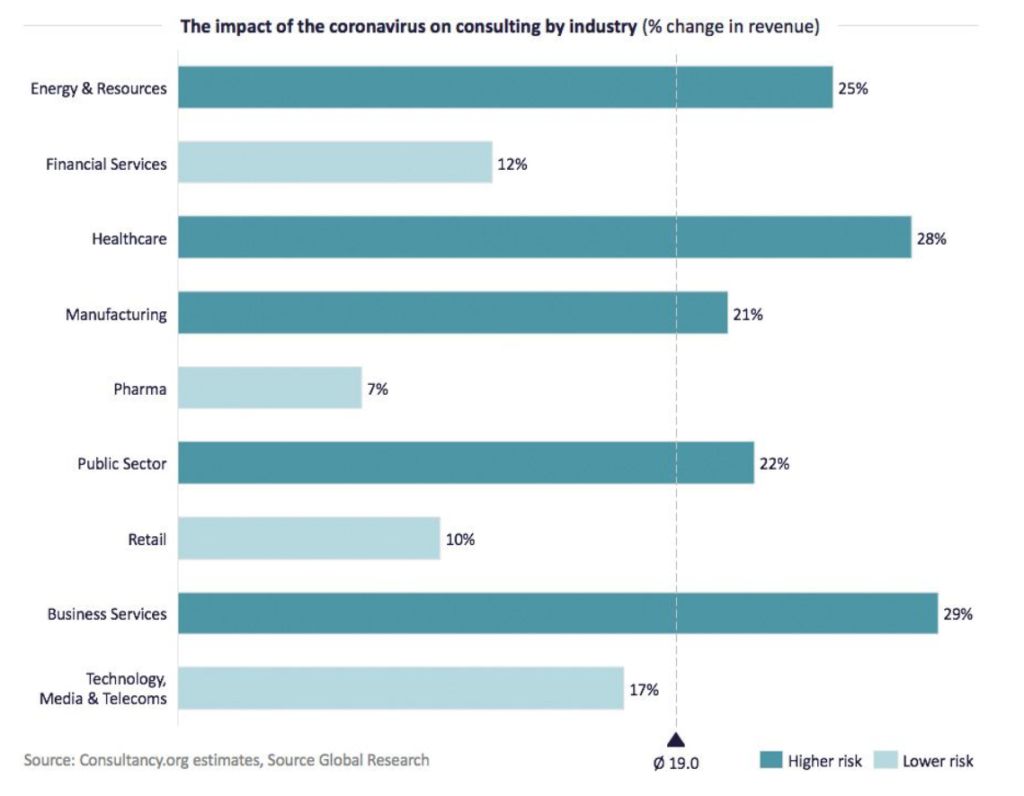
For instance, a consulting firm specialized in Pharma should be less impacted than a firm with a large portion of its sales in the Travel & Tourism industry.
Investigate if your target firm and office is still hiring by contacting the HR and asking for advice, for instance: when it is the best time to apply?
So, for these 2x reasons YES it’s still possible to get a job in Consulting.
Hence, give a shot and apply to consulting firms where hiring is still active.
Action #3: Add Value Within Your Ecosystem
In these challenging times, you want to add value within your ecosystem.
And there is no shortage of opportunities out there.
First, you can do pro bono consulting projects for small and medium businesses that struggle right now due to the COVID-19 crisis.
For instance, MBA students from HEC Paris propose pro-bono consulting services to help businesses go through the COVID-19 crisis.
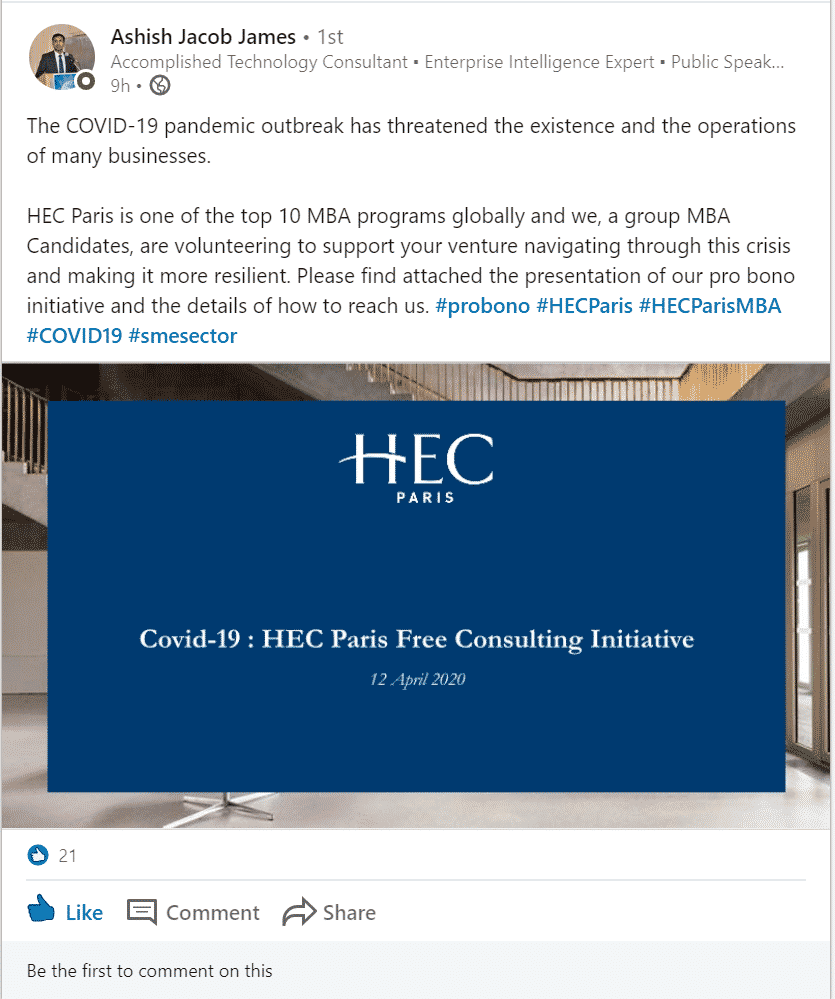
Secondly, there are opportunities to expand your market presence and acquire “share of mind” in uncertain times.
For instance, you can offer consulting firms to organize online conferences with students. Even now, Consulting firms needs to communicate with students. Several on-campus events probably have been cancelled. So, check with them how you can help…
Any other ideas? Let us know in the comment section below…
Action #4: Find Great Partners To Practice
Some of you may struggle finding good case partners now. To help you, I have created a Facebook group. Here is the link.
The objective of this group is for you to schedule mock-interviews with each other. Be respectful, polite and give great feedback to each other. All of you guys are great and willing to put in the effort. With just a bit of empathy you’ll be able to give each other the best feedback you’ve ever gotten.
I have developed this case interview scorecard to help you give great feedback to each other.
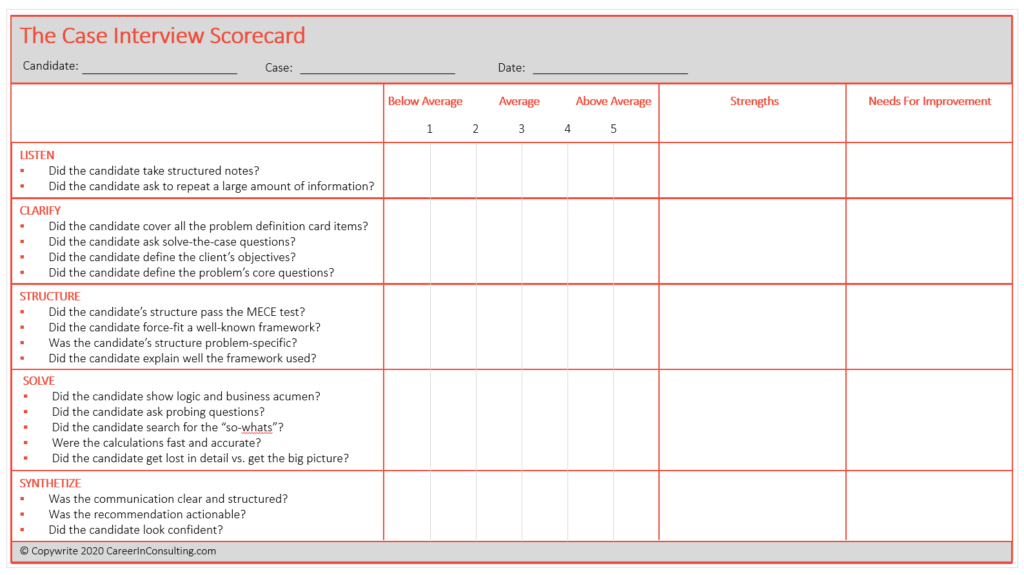
In addition, to help you land a job in Consulting during the COVID-19 crisis, I will select people from this group to review their applications and do mock interviews with them (for free).
Again, if you want to join the group, Here is the link.
Action #5: Be Flexible
Everyone needs to be flexible in times of crisis, because the context is evolving, sometimes every day.
Only those who adapt will make it, so show you are one of them:
- Show your agility by offering choice on your starting date or on your openness to onboard remote
- Don’t be a pain, make it easy with HR when organizing interviews. HR people are probably on fire these days: they have to manage all the new organization changes on top of their own shit…
- Send a list of different visio platforms so that your contact can choose the most convenient for him / her
Action #6: Stay Professional
- Connect 5 to 10 minutes earlier, like for a regular interview
- Be dressed for success like regular interviews. No pyjama…
- Stage yourself: work the light, put a “do not disturb” outside of your room, keep the background neutral
COVID-19 Crisis And Job Search: Wrapping It Up
I don’t have a crystal ball and I can’t predict the future. When you read this article, my recommendation is to adjust the content to your personal situation and to the additional information you might have.
There is no better source of information that the Consulting firms themselves. That’s why one of the actions I shared in this article is about networking.
So, do what is the best for you!
Now it’s your turn: do you think of other actions that can be useful in these weird times?
If yes, leave your ideas in the comment section below.
Stay safe and postive,
Sébastien
Get 4 Complete Case Interview Courses For Free

You need 4 skills to be successful in all case interviews: Case Structuring, Case Leadership, Case Analytics, and Communication. Join this free training and learn how to ace ANY case questions.
SHARE THIS POST

Pingback: How to answer “Why McKinsey?”, “Why BCG?”, or “ Why Bain?” questions - Career in Consulting